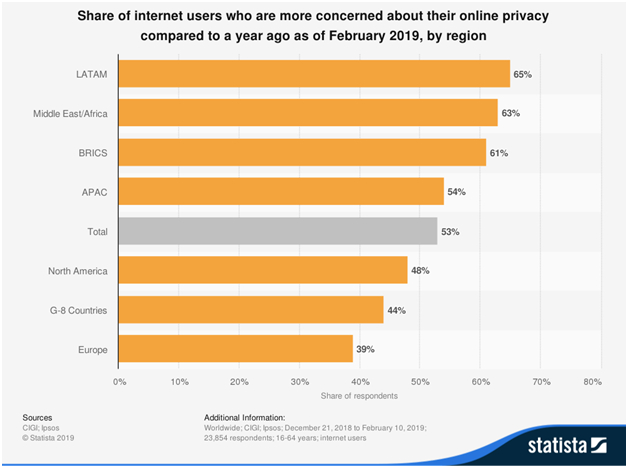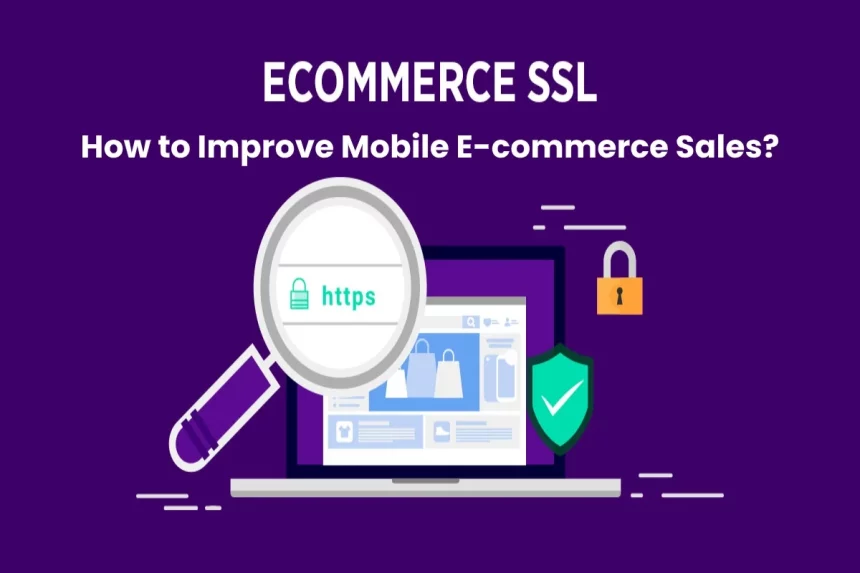E-commerce Sales: The Covid pandemic and the need for social distancing has shifted the brick and mortar stores that existed earlier to e-commerce websites. The increasing awareness amongst customers regarding the safety of their crucial data calls for immediate attention from e-commerce website owners.
A study from Statista (Source: https://www.statista.com/statistics/373338/global-opinion-concern-online-privacy/ ) shows a sharp increase in privacy concerns of personal data by users across the US, Europe, and beyond from 2018 to 2019.

Source: bigcommerce.com
So, an unsecured E-commerce platform and just one data breach are enough to cause irreparable damage to the business’s reputation and sales. Providing a fool proof, secure platform to your customers, complete with an SSL certification, should be your top priority. A better user experience for the customer is the key to sales conversion and the only way to follow success. An SSL Certificate helps you achieve just that. Let us try to understand how SSL Certificate works for E-commerce websites.
Understanding SSL Certificate
The Secure Sockets Layer (SSL) Certificate Provides an authentication certificate to the e-commerce website and a secure path for the crucial information to be shared between the web server and the user’s browser. The data is encrypted before being sent across the internet and prevents web scammers from carrying out breaches on crucial data. Website pages secured with SSL are prefixed with ‘HTTPS’ in their URL address, with ‘S’ standing for secure. A padlock is displayed in the address bar before the website address for safe websites.
The SSL Certificate ensures that the user’s browser encrypts every sensitive data piece before sending it over the internet to the websites’ server. Encryption makes the user’s sensitive data inaccessible to web scammers by encoding them so that it can be read-only by the webserver provided with the authorized key.
It also provides a unique digital identification number to the webserver that serves as an authentication verification for its visitors. An authentication protects consumers from fake websites trying to impersonate their website identity and steal the customer’s online ID to carry out financial transactions or get a new credit card.
SSL Is a Must for E-commerce website
With the web scams increasing day by day and competition getting stiffer among the businesses, it becomes imperative to bring out the best user experience for its customers. A secure platform boosts traffic to your website by giving your website a better ranking on the Search engine result page (SERP). It builds confidence in your visitor to share their sensitive data and help in sales conversions.
Without getting your online platform secure, you would be putting your consumer’s information at high risk, and hackers can use this opportunity to inflict severe losses on the customer data. Any such incidents can ruin your reputation, and your business can be badly affect by it. So, with so much at stake, SSL certificate security is of utmost importance to e-commerce platforms.
SSL Certificates types
According to various requirements and budgets, there are multiple types of SSL Certificates. They can primarily be divide into
- Domain Validation (DV) Certificates
- Organization Validation (OV) Certificates
- Extended Validation (EV) Certificates
Among all these, the Domain Validation (DV)SSL certificates are the most popular ones as they are the cheapest and easiest to obtain. They can provide only the identity confirmation of one domain name and hence are the most basic ones. DV SSL certificates are popular for websites that require single domain validation and do not collect any crucial user data.
Organization Validation (OV) SSL Certificates authenticate the name and the address of the organization, which will receive this SSL certificate. Hence, it takes some more time to receive them and is more expensive.
Extended Validation (EV) SSL Certificates authenticate domain and the organization identity, its legal status if it is currently operating, and address. So, it takes time to get them, and it is much more expensive than the previous two options.
Now, once you have chosen the validation type DV, OV, or EV SSL Certificate required for your website. You can choose between a Standard SSL Certificate or a Wildcard SSL Certificate. A Standard SSL Certificate and the DV SSL Certificate protects only the root domain for which it authenticates and is cheap.
On the other hand, a Wildcard SSL Certificate protects the root domain and the subdomains at one level below the root domain. A website with a wildcard SSL certification is prefix with a unique character (*), which indicates that all the subdomains create one level below the root domain are also protected along with the main domain.
Multi-Domain SSL Certificate offers the facility of adding, modifying the Subject Alternative Name field. This SSL Certificate is just perfect for securing multiple names across different domains and subdomains. For example, with just one Multi-Domain (SAN) Certificate, you can secure the following domains:
www.abc.com
www.abc.net
www.abc1.com
www.abc2.net
Wrapping Up
In conclusion, we can say that for running a successful e-commerce website, its data security is of prime importance. SSL Certificate is the complete solution need for all the security needs of your website. From handling financial transactions with sensitive user details to having a padlock before your website URL that is easily recognizable by users, SSL Certificate Security can win your customers’ trust and help you achieve your sales targets. You can even weigh your best options with the kind of financial investment you are looking at with the plethora of SSL options available.
Maintaining the right balance between your security requirements and also finances. Investing in an SSL Certificate today can help your business grow leaps and bounds.

